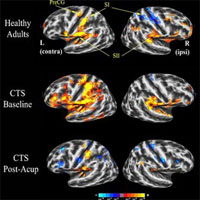WSJ's health columnist Melinda Beck tests out acupuncture as an alternative means to reduce her neck and back pain.
Does It Work?
While scientists say further research is essential, some studies have provided evidence of acupuncture's effects.
• Arthritis of the Knee: Acupuncture significantly reduced pain and restored function, according to a 2004 government study.
• Headaches: Two 2009 reviews found that acupuncture cut both tension and migraine headaches.
• Lower Back Pain: Acupuncture eased it in a big study last year, but so did a sham treatment where needles didn't penetrate the skin.
• Cancer: Has proven effective in reducing nausea and fatigue caused by chemotherapy.
• Infertility: Improves the odds of pregnancy for women undergoing in-vitro fertilization, according to a 2008 review of seven clinical trials.
• Addiction: Often used to help quit smoking, drinking, drug use and overeating, but there is no conclusive evidence that it works.

After decades of cynicism, Western medical experts are using high-tech tools to unravel the ancient mysteries of how acupuncture works. WSJ's Health columnist Melinda Beck joins Simon Constable on the News Hub to discuss.
As fanciful as that seems, acupuncture does have real effects on the human body, which scientists are documenting using high-tech tools. Neuroimaging studies show that it seems to calm areas of the brain that register pain and activate those involved in rest and recuperation.
Doppler ultrasound shows that acupuncture increases blood flow in treated areas. Thermal imaging shows that it can make inflammation subside.
....read more